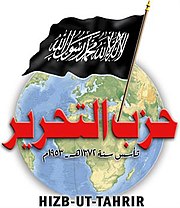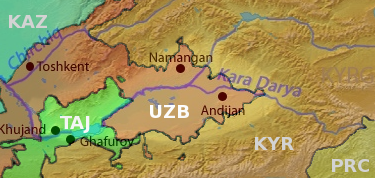Hizb ut-Tahrir حزب التحرير | |
|---|---|
 | |
| Leader | Ata Abu Rashta |
| Founder | Taqiuddin al-Nabhani |
| Founded | 1953 |
| Membership | 10,000–1 million |
| Ideology | Pan-Islamism Islamism Muslim supremacism Caliphalism Salafism Jihadism Anti-secularism Anti-Western sentiment Anti-Hindu sentiment Anti-Christian sentiment Anti-nationalism Antisemitism Anti-Zionism Anti-democracy Anti-liberalism Anti-communism |
| Religion | Sunni Islam |
| Flag | |
 | |
| Website | |
| www | |
| Part of a series on Islamism |
|---|
|
|
Hizb ut-Tahrir (Arabic: حزب التحرير Ḥizb at-Taḥrīr; Party of Liberation, often abbreviated as HT) is a pan-Islamist and fundamentalist group seeking to re-establish "the Islamic Khilafah (Caliphate)" as an Islamic "superstate" where Muslim-majority countries are unified[1] and ruled under Islamic Shariah law,[2] and which eventually expands globally to include non-Muslim states.[Note 1][Note 2] In Central Asia, the party has expanded since the breakup of the Soviet Union in the early 1990s from a small group to "one of the most powerful organizations" operating in Central Asia.[5] The region itself has been called "the primary battleground" for the party.[6] Uzbekistan is "the hub" of Hizb ut-Tahrir's activities in Central Asia,[7] while its "headquarters" is now reportedly in Kyrgyzstan.[8]
Hizb ut-Tahrir is banned throughout Central Asia,[9] and has been accused by the governments of Central Asia of terrorist activity or illegal importation of arms into their countries. According to globalsecurity.org, the group "is believed by some to clandestinely fund and provide logistical support to a wide range of terrorist operations in Central Asia, and elsewhere, although attacks may be carried out in the names of local groups."[10] Human rights organizations and a former British Ambassador have accused Central Asian governments of torturing Hizb ut-Tahrir members and violating international law in their campaigns against the group.[11]
Among the factors attributed to HT's success in the region are the religious and political "vacuum" of post-Soviet society there; the party's well organized structure; its use of local languages; the relatively comprehensive and easy to understand answers it provides to socio-economic challenges such as poverty, unemployment, corruption, drug addiction, prostitution and lack of education; its call for unifying the Central Asian states which appeals to traders and others frustrated by the severe effect on cross-border trade of the rigid and dysfunctional borders in the region.[12][13]
Hizb ut-Tahrir was first started in Central Asia in Ferghana Valley in Uzbekistan[14] and most HT members in the former Soviet Union are ethnic Uzbeks.[10]
In addition to the five ex-Soviet states of Kazakhstan, Kyrgyzstan, Uzbekistan, Turkmenistan and Tajikistan, the adjacent republic of Afghanistan, which was never part of the Soviet Union, and Chinese province of Xinjiang, are (or at least traditionally were in the case of Xinjiang) Muslim majority areas of Central Asia.

- ^ Ahmed & Stuart, Hizb Ut-Tahrir, 2009: p.3
- ^ "Media Office of Hizb-ut-Tahrir. About Hizb ut-Tahrir". Hizb-ut-Tahrir. Archived from the original on 27 September 2007. Retrieved 14 January 2016.
- ^ Rich, Dave (July 2015). "Why is the Guardian giving a platform to Hizb ut-Tahrir?". Left Foot Forward. Retrieved 28 January 2016.
- ^ an-Nabhani, The Islamic State, 1998: p.238-9
- ^ Rotar, Igor (May 5, 2005). "Hizb ut-Tahrir in Central Asia". Terrorism Monitor. 2 (4). Retrieved 8 April 2016.
- ^ Baran, Hizb ut-Tahrir: Islam's Political Insurgency, 2004: 43
- ^ Cite error: The named reference
KARAGIANNIS-2006-316was invoked but never defined (see the help page). - ^ Cite error: The named reference
WAI-Kyrgyzwas invoked but never defined (see the help page). - ^ "Uzbek Officials Detain Alleged Hizb Ut-Tahrir Members". Radio Free Europe Radio Liberty. October 29, 2015. Retrieved 11 April 2016.
- ^ a b "Hizb ut-Tahrir al-Islami (Islamic Party of Liberation)". GlobalSecurity.org. Retrieved 19 March 2014.
- ^ "Uzbekistan: Muslim Dissidents Jailed and Tortured | Human Rights Watch". Hrw.org. 2004-03-30. Retrieved 2015-03-18.
- ^ Baran, Hizb ut-Tahrir: Islam's Political Insurgency, 2004: 80
- ^ Baran, Hizb ut-Tahrir: Islam's Political Insurgency, 2004: 78
- ^ Cite error: The named reference
ZBHTIPI2004:77was invoked but never defined (see the help page).
Cite error: There are <ref group=Note> tags on this page, but the references will not show without a {{reflist|group=Note}} template (see the help page).
© MMXXIII Rich X Search. We shall prevail. All rights reserved. Rich X Search
